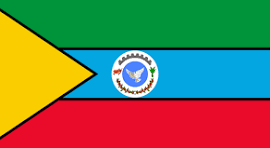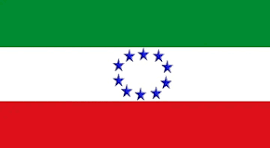THIS VERSION IS A DRAFT AND HAS NOT BEEN OFFICIALLY APPROVED
GOV 3 : Compliance with regulations and standards, and sustainability
Objective
- Define the integration of national regulations, alongside international standards and sustainability principles into the PROCEED programs’ operations. These regulations and standards address both challenges and opportunities identified in the project document and must be effectively implemented throughout the project lifecycle by all stakeholders of the PROCEED program, including the Technical and Administrative Assistances
- Ensure that regional and national regulations, international standards and sustainability principles are effectively integrated into the project and adequately monitored to maintain compliance with the applicable regulations and standards.
Responsibilities:
- RTF Coordinators: ensure that all Procedures are integrated into the PROCEED program activities and implemented. In case of non-compliance or procedural deviations, take appropriate corrective actions and ensure that non-compliance mechanisms (see MoP management) are applied and reported. They are also responsible for maintaining constant attention to sustainability principles throughout the implementation of the program.
- Task Forces: under the coordination of the RTF Coordinator, conduct regular reviews to ensure that safeguards are integrated into every program activities. Specifically, they:
- Monitor the application of regulations, standards and sustainability principles in field activities.
- Identify operational constraints and suggest corrective actions.
- Identify and report non-compliance or procedural deviations
- Ensure continuous feedback to the Steering Committees and Technical Assistance team.
- Steering Committees: oversee the overall alignment with strategic objectives, regulations and standards, and sustainability principles, and facilitating coordination among stakeholders.
- Technical Assistance (ARIA): provides continuous support through implementing documents, capacity-building, training, and guidance to ensure the proper application of the safeguards and sustainability principles.
- External Evaluators: conduct periodic independent evaluations to assess the implementation of safeguards and sustainability principles, and recommend improvements.
Inputs:
- A separate annex (Annex GOV3 A1 - Sustainability Framework). detailing:
- a list of national regulations, international standards and specific environmental and social challenges and opportunities for the PROCEED program, identified through initial assessments.
- a risk and opportunity assessment table documents potential environmental, social, organisational, or institutional risks and opportunities by category, activity (WS or SWC), type, and risk/chance level. The table includes corresponding corrective or mitigation measures, relevant procedures or guidelines for implementation, a monitoring system, and gender-responsive measures, with sustainability principles also integrated into the proposed responses
- The table also includes a description of the process developed to integrate these measures into the PROCEED program activities, and the corresponding Procedures, Annexes, and Implementing Documents.
- A non-compliance process and reporting format to be used when non-compliance or procedural deviations are identified.
Additional risks and opportunities identified during the program implementation shall be documented and added. Field teams, and particularly Task Forces, as well as the Technical Assistance should report new challenges, risks or opportunities based on their daily activities. These inputs shall then be assessed and integrated into the risk and opportunity framework. Corrective actions or adjustments shall be proposed as needed. Regular monitoring ensures continuous improvement and adaptation.
Workflow
1. Pre-project assessment (already conducted)
Before the start of the project, participative initial assessments have been conducted to:
- Review existing national and international regulations, sectoral policies, and relevant guidelines to ensure alignment of the PROCEED program.
- Carry out an environmental and social assessment to identify potential challenges and opportunities.
- Prepare a document presenting the applicable regulations and standards, and sustainability principles to be considered within the framework of the PROCEED program (Annex GOV3 A1).
- Establish the list of procedures required to integrate the identified safeguards into the project, relying on proven and hands-on practices (Annex GOV3 A1).
2. Integration process
- Develop the necessary Procedures, Annexes, and Implementing Documents to ensure the effective integration of regulations, standards and sustainability principles.
- Technical Assistance to provide training and capacity-building sessions for the PROCEED project team and stakeholders to ensure a clear understanding and adherence to these regulations, standards and sustainability principles.
- Embed a sustainability mindset in the decision-making and actions of all stakeholders, ensuring that everyone involved in the project is well-equipped to address environmental and social challenges in an informed and practical manner. For that, the technical assistance will provide on-the-ground training and coaching, particularly to Task Force members, in charge of overseeing the program’s activities (Annex RH1 – A2)
3. Compliance monitoring and reporting
RTF, with the support of the Technical Assistance:
- Conducts regular monitoring to ensure the proper implementation of regulations, standards and sustainability principles across project activities.
- Produces yearly audit reports and progress assessments to evaluate compliance which will be part of the annual report.
- Implements feedback mechanisms to identify gaps and promptly address any compliance issues. If non-compliance or gaps in procedure definition are observed, the non-compliance process and reporting format must be used to document, report, and address the issue appropriately.
- Maintains ongoing oversight to:
- Systematically identify and document additional environmental, social, organisational, and institutional risks and opportunities.
- Categorise each risk or opportunity by activity (WS or SWC) and assess its risk or opportunity level.
- Define corrective or mitigation measures for each identified risk or opportunity, specifying relevant procedures or guidelines for implementation.
- Ensure continuous monitoring and external evaluation to confirm that environmental and social issues as well as sustainability principles are effectively addressed.
4. Periodic external evaluation
- Engage external evaluators to conduct periodic independent assessments of the implementation of environmental & social safeguards and sustainability principles.
- Provide feedback to the Task Forces and Steering Committee, using evaluation findings to refine project activities and enhance safeguard measures as needed.
Outputs:
- Integrated environmental & social safeguards and sustainability principles in the procedures and guidelines within the project, included in the MoP and implementing documents.
- Regular monitoring reports and audit outcomes.
- An external evaluation report, assessing the effectiveness of the safeguard measures, the integration of sustainability principles, and recommending improvements.
Outcomes
- Environmental and social safeguards are fully integrated into the PROCEED program’s operations, with clear procedures and guidelines established in the MoP and Implementing Documents.
- Continuous identification and assessment of risks and opportunities, leading to timely corrective actions and effective mitigation strategies.
- Gradual adoption of a sustainability mindset by the stakeholders, consistently integrating environmental and social considerations into decision-making, reinforcing sustainable practices within the involved institutions.

